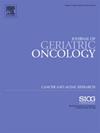格拉斯哥预后评分与老年癌症患者的虚弱程度、死亡率和不良健康后果的关系:前瞻性队列研究。
IF 2.7
3区 医学
Q3 GERIATRICS & GERONTOLOGY
引用次数: 0
摘要
介绍:为了平衡老年患者接受癌症治疗的益处和风险,需要预后信息。由白蛋白和 C 反应蛋白(CRP)组成的格拉斯哥预后评分(GPS)可提供此类信息。本研究的第一个目的是调查作为老年癌症患者健康问题指标的全球定位系统与虚弱、功能衰退和健康相关生活质量(HRQoL)下降之间的关联。第二个目的是研究除临床预测因素外,GPS 对死亡率的预测价值:这项前瞻性队列研究纳入了年龄≥70岁的实体恶性肿瘤患者,他们在开始治疗前接受了老年病学评估和血液采样。利用分批测量的血清白蛋白和 CRP 计算 GPS,分为正常 GPS(0)和异常 GPS(1-2)。随访结果为全因死亡率、日常功能和/或 HRQoL 下降的综合结果或随访一年后的死亡率。日常功能通过日常生活活动和工具性日常生活活动问卷进行评估,HRQoL通过EQ-5D-3L和EQ-VAS问卷进行评估:共纳入192名患者,中位年龄为77岁(四分位数间距为72.3-81.0)。与全球定位系统正常的患者相比,全球定位系统异常的患者更加虚弱(79% 对 63%,P = 0.03)。与全球定位系统正常的患者相比,全球定位系统异常的患者一年后的死亡率更高(48% 对 23%,P 讨论):GPS异常与虚弱和死亡率有关。在这组老年癌症患者中,将 GPS 添加到临床预测指标中后,对死亡率的预测在数量上更胜一筹,但在统计学上并不显著。虽然全球定位系统可能会改善未来老年癌症患者的分层,但仍有必要进行更大规模的研究,包括具有类似肿瘤类型的老年患者,以评估其临床实用性:TENT研究在荷兰试验注册中心(NTR)进行了回顾性注册,试验编号为NL8107。注册日期:2019年10月22日。本文章由计算机程序翻译,如有差异,请以英文原文为准。
Association of Glasgow Prognostic Score with frailty, mortality and adverse health outcomes in older patients with cancer: A prospective cohort study
Introduction
To balance benefits and risks of cancer treatment in older patients, prognostic information is needed. The Glasgow Prognostic Score (GPS), composed of albumin and C-reactive protein (CRP), might provide such information. This study first aims to investigate the association between GPS and frailty, functional decline, and health-related quality of life (HRQoL) decline as indicators of health problems in older patients with cancer. The second aim is to study the predictive value of GPS for mortality, in addition to clinical predictors.
Materials and Methods
This prospective cohort study included patients aged ≥70 years with a solid malignant tumor who underwent a geriatric assessment and blood sampling before treatment initiation. GPS was calculated using serum albumin and CRP measured in batch, categorized into normal (0) and abnormal GPS (1–2). Outcomes were all-cause mortality and a composite outcome of decline in daily functioning and/or HRQoL, or mortality at one year follow-up. Daily functioning was assessed by Activities of Daily Living and Instrumental Activities of Daily Living questionnaires and HRQoL by the EQ-5D-3L and EQ-VAS questionnaires.
Results
In total, 192 patients with a median age of 77 years (interquartile range 72.3–81.0) were included. Patients with abnormal GPS were more often frail compared to those with normal GPS (79 % vs. 63 %, p = 0.03). Patients with abnormal GPS had higher mortality rates after one year compared to those with normal GPS (48 % vs. 23 %, p < 0.01) in unadjusted analysis. Abnormal GPS was associated with increased mortality risk (hazard ratio 2.8, 95 % CI 1.7–4.8). The area under the receiver operating characteristics curve of age, distant metastasis, tumor site, comorbidity, and malnutrition combined was 0.73 (0.68–0.83) for mortality prediction, and changed to 0.78 (0.73–0.86) with GPS (p = 0.10). The composite outcome occurred in 88 % of patients with abnormal GPS versus 83 % with normal GPS (p = 0.44).
Discussion
Abnormal GPS was associated with frailty and mortality. The addition of GPS to clinical predictors showed a numerically superior mortality prediction in this cohort of older patients with cancer, although not statistically significant. While GPS may improve the stratification of future older patients with cancer, larger studies including older patients with similar tumor types are necessary to evaluate its clinical usefulness.
Trial Registration
The TENT study is retrospectively registered at the Netherlands Trial Register (NTR), trial number NL8107. Date of registration: 22-10-2019.
求助全文
通过发布文献求助,成功后即可免费获取论文全文。
去求助
来源期刊

Journal of geriatric oncology
ONCOLOGY-GERIATRICS & GERONTOLOGY
CiteScore
5.30
自引率
10.00%
发文量
379
审稿时长
80 days
期刊介绍:
The Journal of Geriatric Oncology is an international, multidisciplinary journal which is focused on advancing research in the treatment and survivorship issues of older adults with cancer, as well as literature relevant to education and policy development in geriatric oncology.
The journal welcomes the submission of manuscripts in the following categories:
• Original research articles
• Review articles
• Clinical trials
• Education and training articles
• Short communications
• Perspectives
• Meeting reports
• Letters to the Editor.
 求助内容:
求助内容: 应助结果提醒方式:
应助结果提醒方式:


